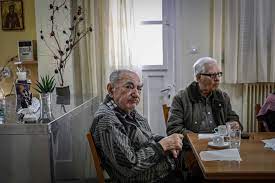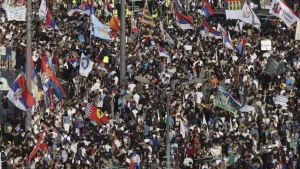Older Greeks find a fix with shared housing

Athens: In an Athenian cafe, four women in their 60s pore over plans for a new kind of home offering an innovative solution to the housing problems many senior citizens face.
Malamo, Thalia, Maria and Tonia plan to live together in what they call “solidarity housing,” a first in a country where elderly people face increasing insecurity after the country’s near-decade-long financial crisis.
“Our aim is to create solidarity housing for senior citizens in the face of insecurity in a society where health benefits are declining and housing prices are soaring,” said pensioner Malamo Stergiou, a former telecoms employee.
A woman stands in a street in Thessaloniki, Greece, on March 8 last year. Elderly people face increasing insecurity in the country due to a nearly decade-long financial crisis.
According to Bank of Greece data, rents have increased by 20 percent since the country officially exited the crisis in 2018.
Two years ago, Stergiou set up a Facebook group called “Cohabitation Communities,” which quickly gained 8,000 followers.
In September last year, she also set up a non-governmental organization called Nama to finance the project. The plan involves restoring a 1938 four-story building in Athens, which the owner is offering at a low rent, and creating 15 independent apartments and communal spaces.
Like most of the project’s supporters, Stergiou lives alone in an apartment in Athens. Her only daughter works abroad, as do hundreds of thousands of young people who left the country, mainly during the 2010-2018 financial meltdown.
The crisis has dealt a serious blow to the Greek family model that historically acted as a safety net for the most vulnerable members of the group.
Elderly Greeks, especially the less well-off, now find themselves without the support traditionally provided by their children.
“What we lack is solidarity in the face of daily problems, whether financial or emotional,” said Thalia Novaki, a retired civil servant.
A similar Facebook group was created in January last year in the northern metropolis of Thessaloniki, Greece’s second-largest city.
“I’m afraid of loneliness. I’m not a homeowner and the idea of living together makes me happy,” said Olympia Manoussoyannaki, a secondary school teacher nearing retirement age.
Members of that collective visited similar initiatives in Germany and Denmark for ideas, said Filippos Polatsidis, founder of the Thessaloniki group.
With 22.7 percent of its population aged 65 or older according to a 2021 census, Greece ranks fourth among EU states with the highest proportion of people in that age bracket, behind Italy (23.8 percent), Portugal (23.7 percent) and Finland (23.1 percent), Eurostat says.
Upon being re-elected to a second four-year term in June last year, Greek Prime Minister Kyriakos Mitsotakis created a new ministry for social cohesion and family issues to tackle what he called the “national danger” of a “demographic collapse.”
Despite a slight rise in the fertility rate after the end of the crisis — from 1.37 children per woman in 2019 to 1.43 in 2021 — Greece remains below the EU average rate (1.53 in 2021), Eurostat says. The government has announced an increase in child benefits to 2,400 euros (US$2,600) for the first child, 2,700 euros for the second and 3,000 euros for the third.
However, experts say that measures must be broader than just increasing the fertility rate.
“We need to meet the needs of young families, by multiplying childcare facilities, and the elderly, whose numbers are increasing thanks to the rise in life expectancy,” said Valia Aranitou, a professor of sociology at the University of Athens.
The demographic decline is mostly visible in the Greek countryside, which is becoming increasingly depopulated. Athens and Thessaloniki account for almost half of Greece’s population of 10.4 million, which actually fell 0.5 percent from a year earlier.
One example is Petrokerassa, a village 45km from Thessaloniki, which lost half its population in past decades and now numbers just 137 inhabitants — 80 percent of them senior citizens.
“In winter if we call for help, no one will hear us,” said Thodoris Yannoudis, a 62-year-old local woodcutter.





